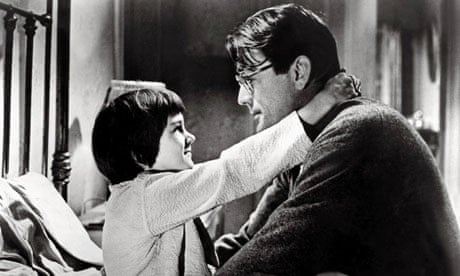Hey, England soccerball fans, turn those frowns upside down! This summer isn't a total washout. Sure your boys might have lost both their pants and their game thingummyjig but the best is yet to come, something that will absolutely have you rehanging your bunting, repainting your cheek and rechanting those songs that rely more on slurred sentiment than coherent lyrics. You know what I'm talking about: it's the 50th anniversary of To Kill a Mockingbird! High five, boys, don't leave me hanging!
More than 50 vuvuzela-free anniversary celebrations are scheduled across the US this 11 July for Harper Lee's glorious tale about a young girl named Scout, her father Atticus Finch and a creepy neighbour called Boo Radley. From such oddly named seeds, true flowers bloom, a moral that those of us with similarly strange names find deeply heartening.
Yet with a predictability that verges on the sophomoric, a backlash against the book and its author has been building. Lee has managed to live in a state of carefully maintained seclusion for the past half century, and yet in the last few months has been attacked by the likes of both Malcolm Gladwell and the Mail on Sunday, which, in terms of learning about the modern world, is like that moment in Bill & Ted's Excellent Adventure when Joan of Arc finds herself trapped in a phone booth with two slackers from California (with apologies to Bill and Ted for comparing them to Gladwell and the Mail on Sunday).
It was in an article in the New Yorker that Gladwell complained about what he saw as Finch's simplistic explanation of the Ku Klux Klan to Scout: "Finch does not want to deal with the existence of antisemitism. He wants to believe in the fantasy of Sam Levy down the street, giving the Klan a good scolding." Funnily enough, this argument, which was echoed last week by the Wall Street Journal, is similar to one my fourth-grade teacher used, and even then I knew she was – to use 1980s fourth-grader parlance – a total loser. As the American website jezebel.com suggested quite rightly, perhaps the reason Atticus's explanation is a little soft is because he is talking to his six-year-old daughter, whom he does not want to have nightmares about lynchings. This, as Gladwell may or may not understand, is what is known as fiction, when there are a variety of subtle voices contained within the narrative, as opposed to, say, one monotonously smug one that owes more to linguistic razzle-dazzle than to logic.
Then the Mail on Sunday, reliably, managed to scale new heights of inanity on this topic. Having apparently exhausted the stores of sneering it could direct at Christine Bleakley last weekend, this "news"-paper turned to its next obvious target, Harper Lee, essentially doorstepping the 84-year-old recluse. The paper then duly trumpeted that it had scored an interview with her, even though that interview consisted of precisely five sentences. It then conducted a masterclass in its usual method of padding, by spewing out utterly unproven rumours about the author while coyly denying them in the same sentence.
If sneering at TKAM is fashionable then backlashes have long been more so, which makes much of this hoo-hah inevitable. Another factor here is undoubtedly Lee's reclusiveness, given that she is, by definition, not going to defend her book. Reclusive celebrities always attract both fascination and cynicism, as proven by the ghoulish reports of JD Salinger's death in January, most of which – Mail-style – rehashed unproven rumours about his personal life. But this just reflects what is expected of the famous these days. Yesterday, Forbes published its inexplicably vaunted annual Celebrity Power List, which features such crucial players as Britney Spears and Simon Cowell. Forbes, you see, compiles its list by adding up the celebrities' earnings, media exposure and presence on Twitter and Facebook, all of which is a bit like deciding who is important according to how often they are photographed coming out of the Groucho. But it is unlikely anyone will be marking the 50th anniversary of The X Factor. Go Harper.
News that Steve Carell is to leave The Office is hard to take
But it's not all good this summer. Insert ominous music – Steve Carell is leaving The Office; insert zooming closeup of everyone in the world making a collective wail of despair! 30 Rock is currently the US sitcom to love, but that generally only makes one smile, whereas The Office still makes me laugh out loud all alone like a loon. Carell has said the show will continue without him and, true, some sitcoms live on after the departure of their celebrity star (A Different World actually improved once Lisa Bonet left), but most do not. Nor is that even the point.
The US version of The Office is about a zillion times better than the original UK one and this is largely down to Carell, who is not just a better comedian than Ricky Gervais but, crucially, a more generous one. In the US version, every minor character is given a real role whereas only the truly obsessive can remember anyone from the UK Office other than Tim, Dawn and Gareth. And for that alone, this weekly opportunity to watch a rare comedian who is not all-consumed by his own ego, Carell's departure is very, very hard to take and, as his character Michael Scott would say, that's what she said.

